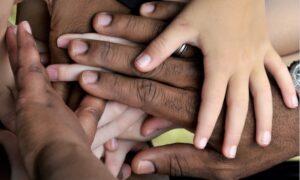Rome (NEV), 19th October 2023 – Interview to Dr. Elizabeta Kitanovic, Programme Officer / Advocacy and Dialogue of the Conference of European Churches (KEK).
*For italian version click here*
How is the international community in Brussels living and what are the main social issues at the moment?
All sorts of conflicts in daily evolving geopolitical circumstances ranging from Russia/Ukraine war, the unfreezing of conflict between Armenia and Azerbaijan currently resulting in the humanitarian disaster for 120 000 internally displaced from Nagorno-Karabakh/ Artsakh, to the recent eruption of renewed warfare between Israel and Hamas have a spillover effect on international community living in Brussels. Two terrorist attacks in France and Belgium are the newest, most visible spillover effects. At the same time EU institutions are trying to navigate this ever-changing landscape, getting even more complex and less predictable by the day, by forwarding the EU’s twin green and digital transitions toward resilience and sustainability and ensuring that they are just and aspiring to greater solidarity, while preparing for the upcoming elections in 2024 and deliberating on strategically, politically, legally, economically and socially the viable road ahead to the next 5 years.
How are the KEK and the Christian representatives working on aspects of integration and social stability?
The document Call and Witness, adopted by tour Governing Board in 2021, is the strategic guidance for CEC toward the achievement of just peace, human-rights based integration, and protection of worship places and cultural heritage. We see this as drivers for having thriving resilient and sustainable religious communities. The strategy is supported by our member churches that were gathered in Tallinn for the General Assembly in June and the new Governing Board who meets in Brussels in November will have on their agenda questions relating to the continued implementation. The most prevalent outcome of the strategy is the Pathways to peace Initiative which aims at preparing Europe and European churches for a post-war situation in Ukraine.
 What’s the state of the art of the “Safer and Stronger Communities” SASCE initiative (project goals and critical issues)?
What’s the state of the art of the “Safer and Stronger Communities” SASCE initiative (project goals and critical issues)?
The project Safer and Stronger Communities is in its final reporting stage. As consortium we have reached our goals to create ambassadors’ network, established reporting mechanism, briefings and trainings of religious leaders, staff and worshippers on the security protection of the worship places. We in CEC have reached approximately 113 European churches in 14 EU countries, organized 25 training and 25 briefing sessions for Christian communities and engaged 360 direct beneficiaries and indirectly many more via CEC communication channels.
How can the Brussels attack be interpreted, in your opinion, in light of the destabilization of Gaza and Israel?
Unfortunately, it seems that critical situations of “lonely wolfs” atrocious actions will continue. If we, as society and religious communities want to avoid these attacks, the sustained work on finding the lasting balance between European external and internal policies is needed. It also encompasses going beyond interreligious dialogue to establish genuinely strong credible interreligious cooperation and mutual support, respectful for plurality and diversity. As society we lack reflexivity and sound dose of self-criticism preventing us from realizing in advance consequences of our own individual or/and collective acts.

The numerous ongoing conflicts, from Ukraine to Nagorno-Karabakh to the Middle East, tell us of a humanity in danger. Are we still capable of mediation, reconciliation and cooperation?
Meditation, reconciliation and cooperation are the very stuff of human existence and humane living, and they need constant rejuvenation, reasserting and repowering. Hence, everyone, every sector, every religion, every society and all politics and sciences should make best efforts to rejuvenate, reassert and repower mediation, reconciliation and cooperation, for saving the humanity from the great danger it is now in, in order to provide the safe future for the next generations and well-being and prosperity for all, leaving no one behand.
Learn more:





























